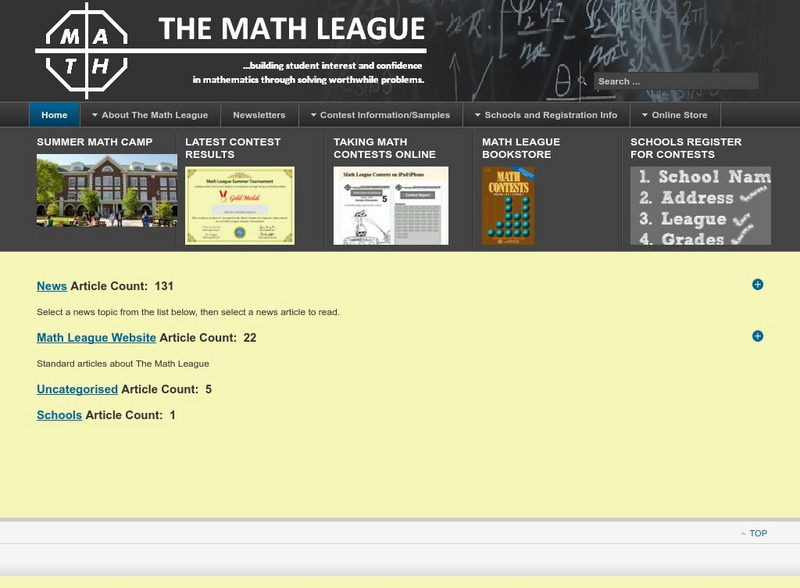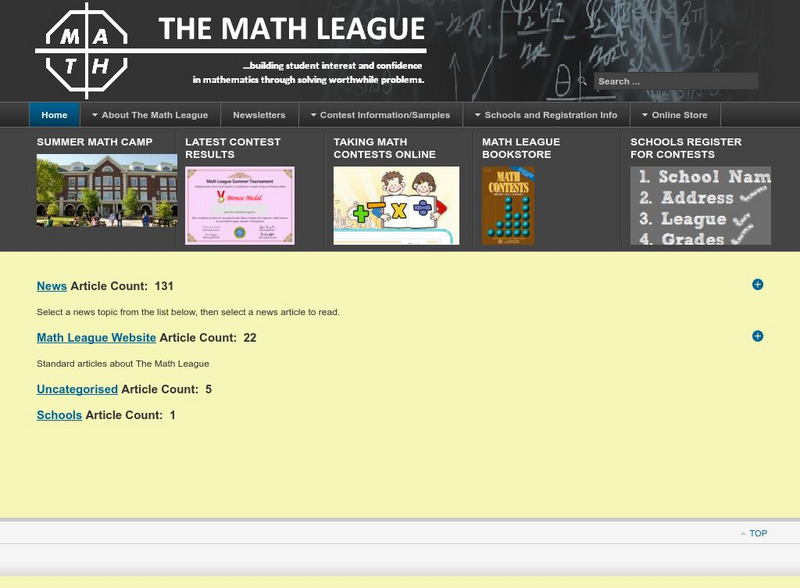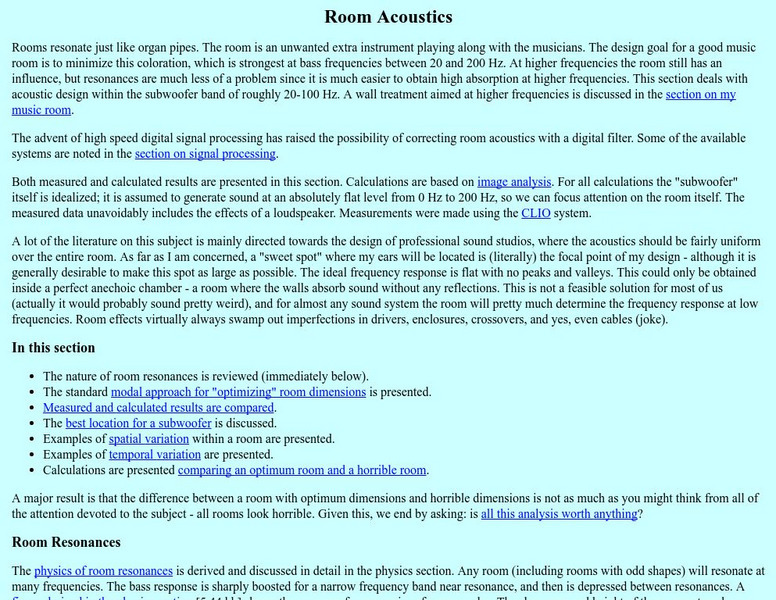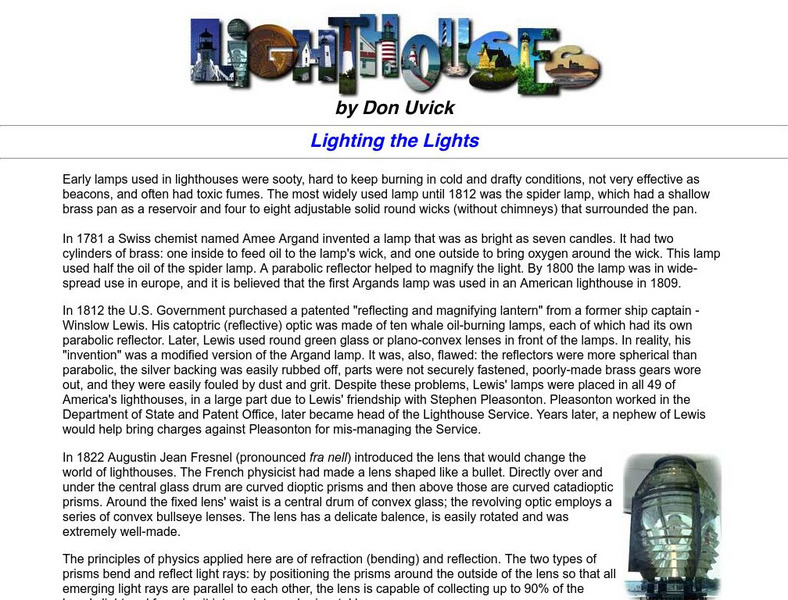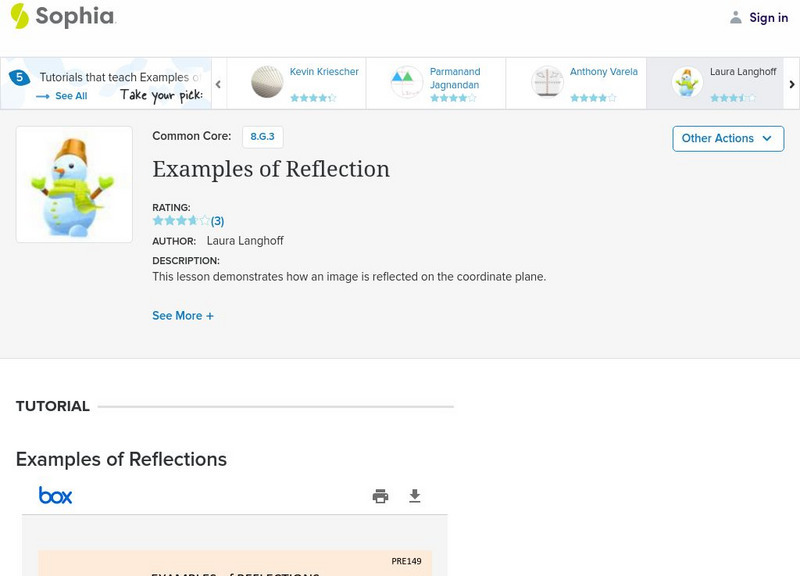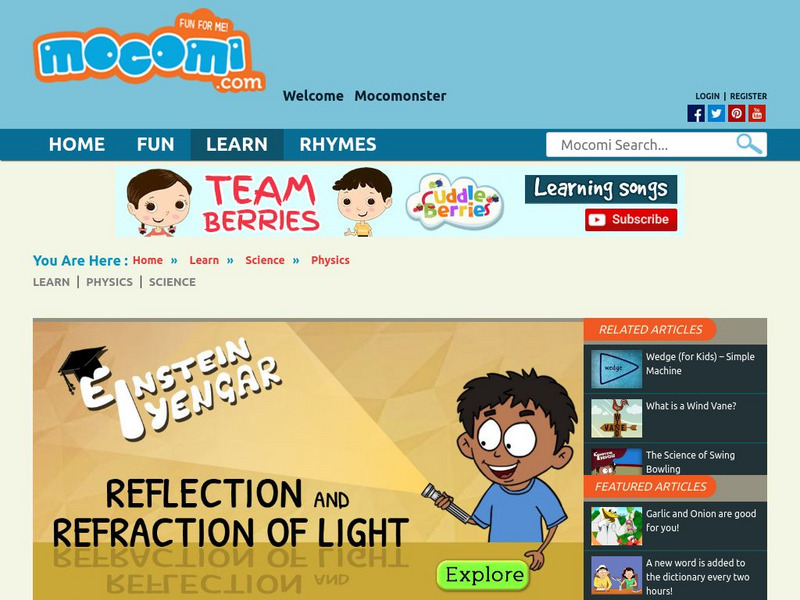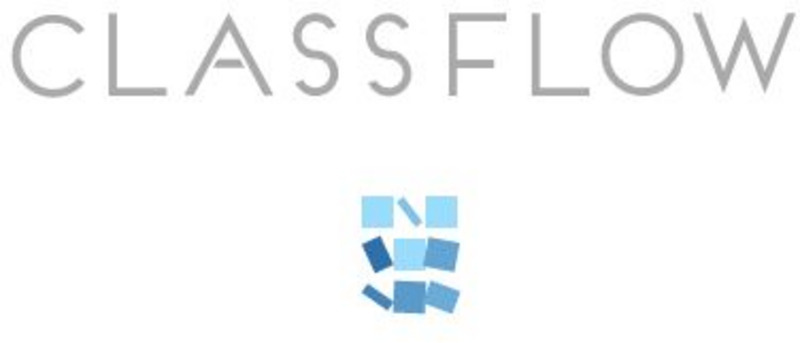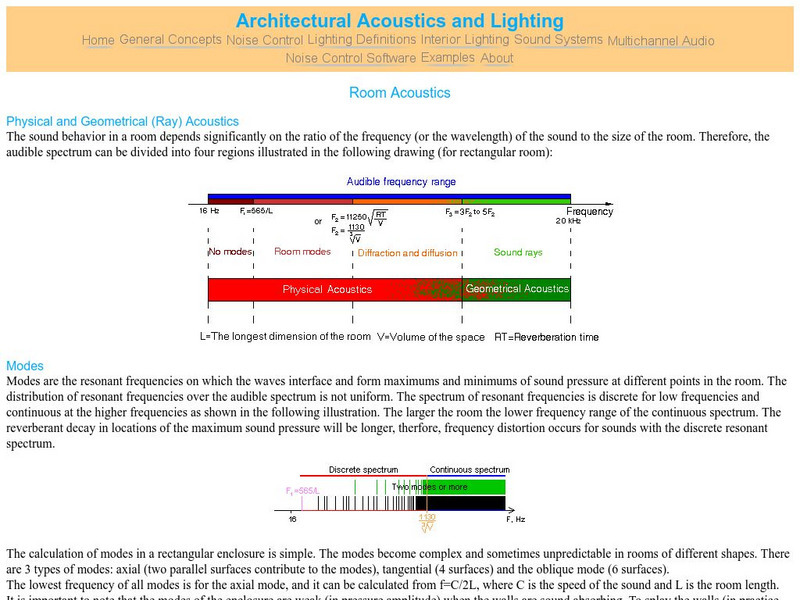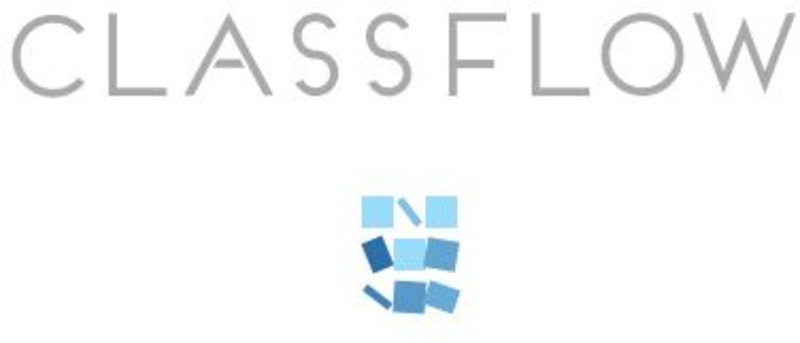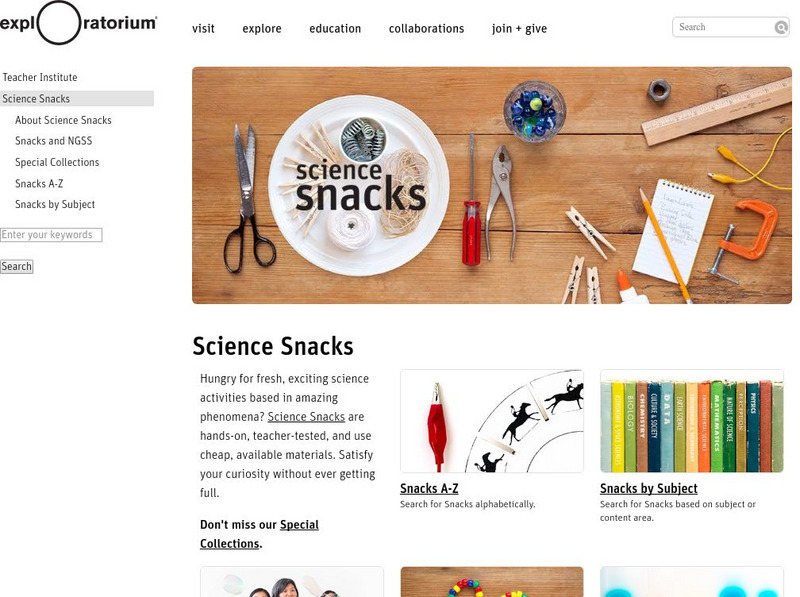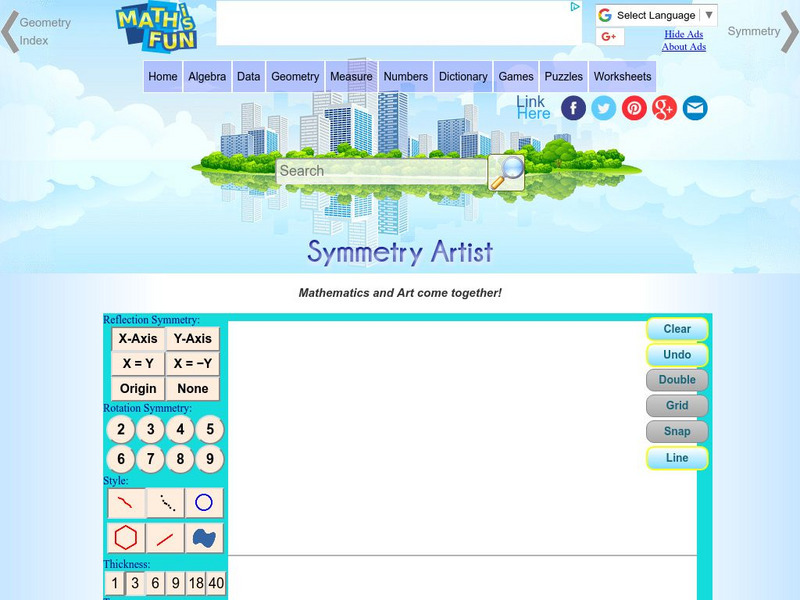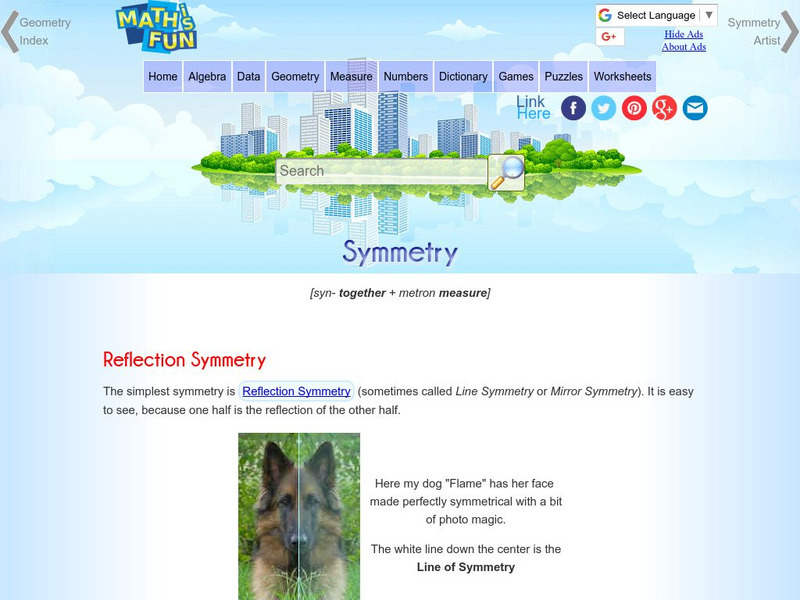The Math League
The Math League: Similar Figures
This tutorial explains what similar figures are in geometry and provides examples.
The Math League
The Math League: Symmetric Figure
This tutorial features several examples of symmetric figures to explain how the line of symmetry works.
Other
Silcom: Room Acoustics
A detailed discussion on the effect of reflection and absorption of sound waves by walls upon the audio quality of a room. Methods for inspecting the quality of a room are given and discussed.
Other
United States Master Swimming: Fiber Aquatics
The principle of total internal reflection is discussed in this article. The appearance of objects from inside the water of a swimming pool is compared to the path of light in a fiber optic cable.
Other
Lighthouses: Lighting the Lights
A description of the early lights used in lighthouses and how these lights evolved into what they are today. Explains the contributions of Fresnel to the development of these lights; discusses the Fresnel orders.
California State University
California State University, San Bernardino: Inverse Functions
This site has many links to examples of inverse functions, including intersections, inverse by reflection, and graphing inverse functions.
Daily Teaching Tools
Daily Teaching Tools: Student Behavior Contract
This Daily Teaching Tools resource provides a behavior management tool. A contract is provided as a motivational tool to keep students reflective and accountable for their actions.
Sophia Learning
Sophia: Examples of Reflection: Lesson 2
This lesson demonstrates how an image is reflected on the coordinate plane. It is 2 of 5 in the series titled "Examples of Reflection."
Sophia Learning
Sophia: Examples of Reflection: Lesson 3
This lesson demonstrates how an image is reflected on the coordinate plane. It is 3 of 5 in the series titled "Examples of Reflection."
Ducksters
Ducksters: Physics for Kids: Wave Behavior
Kids learn about the behavior of waves in the science of physics including reflection, refraction, diffraction, polarization, absorption, and interference.
Mocomi & Anibrain Digital Technologies
Mocomi: Reflection and Refraction of Light
What happens when a ball is thrown against a wall? This narrative illustrates how light is reflected or refracted in different circumstances.
ClassFlow
Class Flow: Tangrams
[Free Registration/Login Required] In this flipchart, students use the interactive features in Activstudio to simulate translations and reflections using objects. Students develop and apply their understanding of geometric sense by...
ClassFlow
Class Flow: Transformations
[Free Registration/Login Required] In this flipchart, students apply multiple transformations to create congruent and similar figures in any or all of the four quadrants. Students apply their geometric sense by using multiple...
ClassFlow
Class Flow: Transformations
[Free Registration/Login Required] This is a simple flipchart to explain the vocabulary of transformations.
Synopsys
Synopsys: A Gentle Intro to Optical Design: Why Is the Sky Blue?
Discusses Rayleigh scattering in plain language and attributes the blueness of the skies to this phenomenon. Discussion of scattering is just one topic of many on this lengthy page of optical topics.
Other
Architectural Acoustics and Lighting: Room Acoustics
This site from Architectural Acoustics and Lighting provides a discussion of various factors affecting the acoustics of a given room. Room dimensions, the wavelength of the sound wave, the physical characteristics of the walls, the...
ClassFlow
Class Flow: How We See Things
[Free Registration/Login Required] In this unit children learn that mirrors and shiny surfaces alter the direction in which light travels and that when they see objects light enters the eye. Children contrast reflection and shadow...
ClassFlow
Class Flow: Introduction Lesson on Light
[Free Registration/Login Required] This flipchart is an introduction lesson on light. It explains absorption, transmission, and reflection. It contains real pictures that allow students to see how matter in an object determines how much...
ClassFlow
Class Flow: Introduction to Light
[Free Registration/Login Required] This flipchart introduces fifth graders to the science of light. Principles such as transparent, translucent, opaque, reflection, and refraction are covered. Concave and convex mirrors and lenses are...
Exploratorium
Exploratorium: Snacks
Exploratorium's snacks aren't edible, but they are good! Use your science skills to discover gravity, learn about biology, do fun experiments.
Math Is Fun
Math Is Fun: Symmetry Artist
The learning activity explores symmetry. Students combine mathematics and art as they investigate reflection and rotation symmetry.
Math Is Fun
Math Is Fun: Symmetry
Students learn about symmetry. Topics explored are reflection, rotational, and point symmetry. Examples and definitions are included.
Sophia Learning
Sophia: Reflecting on Reading
This lesson explains the reading strategy of reflecting on reading. This tutorial lesson shares a short slideshow with the lesson's content.
University of Cambridge
University of Cambridge: Nrich: Transformations on a Pegboard
This one page website can expand your logic, Motion Geometry and pattern recognition knowledge. The solution is available to double check your answers.


